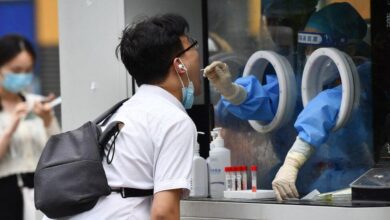Soyh Africa Records First Coronavirus Deaths and 1170 Confirmed Cases

A shaken South Africa on Friday announced its first two deaths from the coronavirus as the country’s cases rose above 1,000 and a three-week lockdown began, with some police screaming at the homeless on emptying streets.
The health minister said the deaths occurred in Western Cape province, home of Cape Town. South Africa has the most virus cases in Africa, with the total across the continent now above 3,200.
Security forces with megaphones screamed at people shortly after midnight in downtown Johannesburg, the country’s commercial hub. Homeless people scattered, looking for shelter, to the astonishment of residents who lined up on balconies and filmed the patrols with their mobile phones. One baton-wielding officer took chase.
Some motorists were pursued, stopped and searched. “Go home,” security forces shouted. “You cannot be outside … You are so selfish.” Around 3 a.m., sustained gunfire echoed through the streets.
South Africa’s military helped to enforce measures that include bans on sales of cigarettes and alcohol, even dog-walking.
Some feared the abuse of power. In Rwanda, which imposed a lockdown over the weekend, police have denied that two people shot dead on Monday were killed for defying the new measures.
South African President Cyril Ramaphosa, in full military uniform, on the eve of the lockdown told troops to be a “force of kindness” and reminded police that “our people are terrified right now and we should not do anything to make their situation worse.”
People should go out only for essentials such as groceries or medical care or to provide essential services. Public transport operates only during rush hour. Some people reported being charged double.
“We are putting our lives at risk,” said one commuting worker, Simphiwe Radebe, saying they had little choice. “Please pray for us.” Minibus taxis were sprayed with disinfectant before passengers boarded, leaving spaces between them, some wiping their hands.
Some people were openly scared. One caller to a popular morning radio talk show dissolved into tears: “I feel there’s nothing we can do,” he said.
Anxiety is especially high among low-income South Africans squeezed into crowded townships with limited water supplies. Fears of an increase in domestic violence and rape have been expressed by civil society groups.
“Social distancing is very impossible here,” said Sipho Moyo, a manicurist who lives in Johannesburg’s downtown Hillbrow neighborhood. “I share a room with two other people. The next room has four people, another room has a family. We all share one bathroom and a kitchen. We all try our best to maintain distance and cleanliness but it is difficult, as you can imagine.”


























